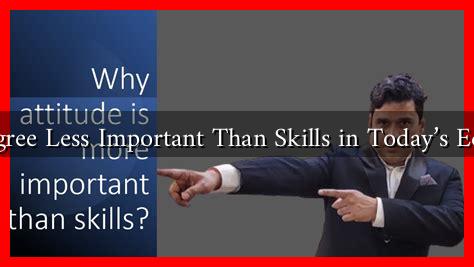-
Table of Contents
Is a Degree Less Important Than Skills in Today’s Economy?
In recent years, the debate surrounding the value of a college degree versus practical skills has intensified. As the job market evolves, many are questioning whether a formal education is still a prerequisite for success. This article explores the shifting landscape of employment, the importance of skills, and how they compare to traditional degrees in today’s economy.
The Changing Job Market
The job market has undergone significant transformations due to technological advancements, globalization, and changing employer expectations. According to a report by the World Economic Forum, over 85 million jobs may be displaced by 2025 due to automation, while 97 million new roles may emerge that are more suited to the new division of labor between humans and machines. This shift emphasizes the need for adaptability and skill acquisition over traditional educational pathways.
The Rise of Skills-Based Hiring
Employers are increasingly prioritizing skills over degrees. A survey conducted by LinkedIn found that 74% of hiring managers believe that skills are more important than formal education. This trend is particularly evident in industries such as technology, where practical experience and specific skill sets often outweigh the need for a degree. For instance:
- Tech Industry: Companies like Google and Apple have shifted their hiring practices to focus on skills and experience rather than degrees. Google’s own research indicates that the best predictors of job performance are not academic credentials but rather skills and competencies.
- Trade Jobs: Skilled trades such as plumbing, electrical work, and carpentry often require certifications rather than degrees. These professions are in high demand and can offer lucrative salaries without the burden of student debt.
Case Studies: Success Without a Degree
Numerous successful individuals have demonstrated that a degree is not the only path to success. Here are a few notable examples:
- Elon Musk: The CEO of Tesla and SpaceX attended college but dropped out. He attributes much of his success to self-education and hands-on experience in his fields of interest.
- Richard Branson: The founder of the Virgin Group struggled with dyslexia and dropped out of school at 16. He built a multi-billion dollar empire through entrepreneurial skills and innovative thinking.
- Steve Jobs: The co-founder of Apple famously dropped out of Reed College. His success was driven by his passion for technology and design, not by formal education.
The Importance of Lifelong Learning
In today’s fast-paced economy, the concept of lifelong learning has gained prominence. Continuous skill development is essential for career advancement and job security. Here are some key points to consider:
- Online Learning Platforms: Websites like Coursera, Udacity, and LinkedIn Learning offer courses that allow individuals to acquire new skills at their own pace, often at a fraction of the cost of traditional education.
- Networking Opportunities: Engaging in workshops, seminars, and industry conferences can provide valuable networking opportunities that can lead to job offers and collaborations.
- Certifications: Many industries now offer certifications that validate specific skills, making them attractive to employers looking for expertise without the need for a degree.
Conclusion: The Future of Education and Employment
As we navigate the complexities of the modern economy, it is clear that skills are becoming increasingly important. While a degree can still provide foundational knowledge and open doors, practical skills and experience are often the deciding factors in hiring decisions. The rise of skills-based hiring, coupled with the success stories of individuals who have thrived without traditional degrees, underscores the need for a shift in how we view education and employment.
In summary, while degrees may still hold value in certain fields, the emphasis on skills and practical experience is reshaping the job market. As technology continues to evolve, individuals must prioritize continuous learning and skill development to remain competitive. The future belongs to those who can adapt, learn, and apply their skills effectively in an ever-changing landscape.
For more insights on the evolving job market and the importance of skills, you can visit Forbes.


